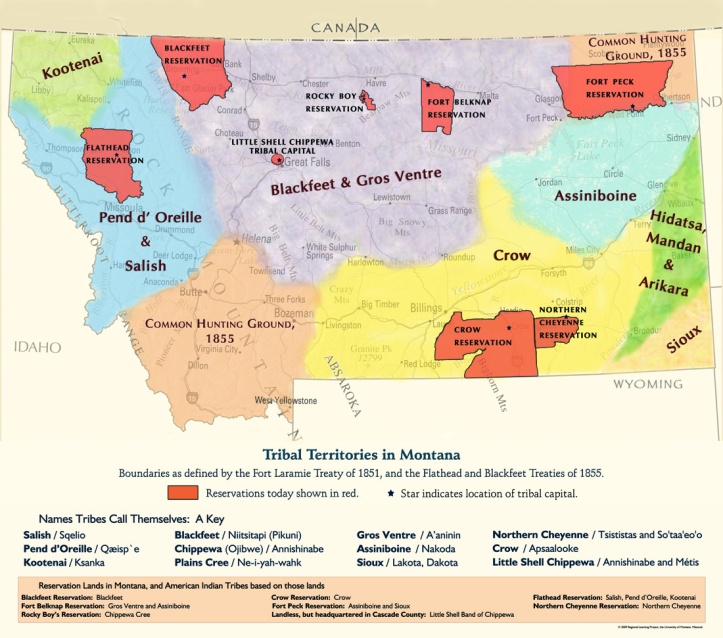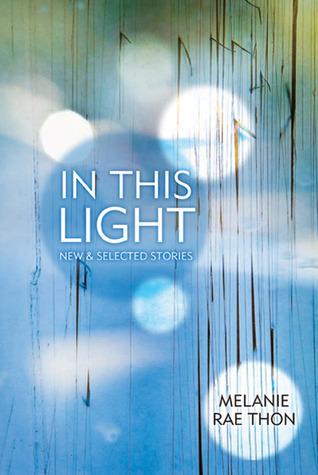In This Light is one of the oldest collections on my shelf of books I own. I purchased it at a reading in 2011 (it was published by Graywolf Press that year) and met the author. I picked her up at the airport and was invited to a (free) pre-reading dinner at the pricey inn on the campus of the University of Notre Dame. This was before I took notes at readings, so I don’t have anything to add about the author other than I remember at dinner she ate only steamed vegetables and she admired my colorful dress.
I had previously read Thon’s collection of short stories called Girls in the Grass (1991) and her novel Sweet Hearts (2001). In This Light contains new short stories and some old ones from the collections Girls in the Grass and First, Body. I knew Thon’s style was visceral and dark, and that she uses Native American characters in many stories, though I’m not sure she’s Native American herself. She grew up in Montana and has said, “I’m fascinated with the way conflict and solace come together in Native American history.” Most of the stories in the collection are set in Montana (and some in the town where Thon was raised).

In This Light is 266 pages long, but it went by so quickly when I was reading. It was disconcerting to note a short story that clocked in at 40 pages, but then feel great joy in getting carried away and reading the whole thing in one sitting. Thon comes from an academic and literary tradition — she herself has taught creative writing at a number of universities — so the sentences are more challenging to dig into. Thus, stopping the experience of reading to analyze a single sentence can lead to confusion. It’s so easy to flow along in the head of a narrator that pausing to reflect can destroy the poetic story building. For instance, here is a passage that makes perfect sense in the flow of things, but stopping to analyze the language leaves me scratching my head:
Sometimes when I dream, the night I met Vincent Blew is just a movie I’m watching. Every body is huge. Yellow Dog’s brilliant face fills the screen. He grins. He hangs on to that torch too long. I try to close my eyes, but the lids won’t come down. His body bursts, shards of light; his body tears the sky apart. Then everything’s on fire: pond, grass, hair — boy’s breath, red shirt.
My solution was to NOT stop and dig deeper, but to enjoy the story itself. That worked beautifully.

Several of the stories describe children, especially girls, who turn nearly feral without supportive parents. They break into homes to shower, use drugs, dance wildly in a way that suggests emotional deterioration as they try to hang on to their humanity.
But in one story, a poverty-stricken woman collects all the abandoned children in her community and tries to care for them. Thon makes it clear that when children and parents are separated, it’s unlikely they will reunite. There is a line that children are forced to cross, and when they do, they can’t return:
Out here in the woods, down in The Child Dump, everybody was half-human. If you stole groceries to eat in Depot Park, you could convince yourself you might go home someday, scrub yourself clean, eat at your mother’s table. But if one day in August you got so hungry you ate crackling bugs rolled in leaves, you had to believe you’d turned part lizard and grown the nub of a tail.
Thanks to Thon’s choice to write stories in various points of view (past or present, first or third), readers get a variety of experiences with characters coming from different backgrounds, from the fringe of society sentenced to death to the privileged who are forgiven their crimes. It’s easy to remain in whatever point of view in which the story was written, to get sucked into the lived experience of a character who watches a storm cloud brew over life.
I was glad I read In This Light, not only because it is the first short story collection I’ve read in over 16 months (!), but because it is a smart, compelling collection written by an author whose dream-like prose gels beautifully with her unique narratives.

Whoops. I clicked that “Like” star in my WordPress Reader! 😉 Force of habit.
This sounds fascinating. I like that she writes from so many different viewpoints. I had to read the paragraph you shared twice before I felt like I got it. But I liked it.
LikeLike
Hahaha, I don’t mind that people click the “like” button. Since I turned it off, all that means is I don’t see the likes anymore. Honestly, it’s reduced my anxiety about numbers and the group of strangers who always stop by and “like” everything within a few minutes.
Isn’t it weird how that paragraph is challenging, but then it’s like…okay, I’m on board.
LikeLiked by 1 person
I’m like you-if I find the sentences aren’t making sense word by word, I find reading them together without stopping makes the narrative flow better. I suspect this is how the author meant them to be read anyway, and that’s probably just the way the words flow in their head? I don’t know, maybe you have a better idea of why this happens.
LikeLike
I think this author carefully builds a lyric style that gets more and more lyrical as the story progresses so it’s like being on a roller coaster and you can’t get off. If she started the stories in a more dreamy sort of prose, I’d probably never finish one of her stories. They’re very much grounded in reality right away.
LikeLiked by 1 person
“My solution was to NOT stop and dig deeper, but to enjoy the story itself.” That pretty much sums up my philosophy towards reading in general. In fact, if I find myself thinking about how it’s done, then I know it means the story has lost me. It’s really only when writing a review that I think about the author’s methods at all.
This sounds most intriguing – I think I may have to try to get hold of a copy… 😀
LikeLike
Melanie Rae Thon’s reading is great across the board. She has many books published. I tend to think a lot about how writers are doing what they do because that’s my background and degree. I love dissecting possible intentions for choices within a story. Now…actually doing what they’re doing and writing my own stories is much harder!
LikeLiked by 1 person
I find it shocking to have to think about kids living/subsisting without parents. I wonder what her experience of it is. I know we hear about neglected kids, kids from dysfunctional families, often enough but I always get the sense there is a wider community or neighbourhood that cares however ineffectually. I guess however much reading I do I live an insulated middle class life.
LikeLike
It wasn’t until 10 years ago, when I moved to my current city, that I realized, “Wow, homelessness is real.” My city has a large homeless population–they even set up a “homeless tent city” several months back that had to be cleared out a bulldozed. I never saw that where I grew up. There were lots of people living in terrifying poverty, but they were surviving. Where I am now, I saw a man and his small child walking the streets in the middle of the night carrying several garbage bags. What do you do? Is the child lucky she has someone? Should she be elsewhere? It’s a hard question. I’ve read other books starring Native American families, and it seems like removed parents is quite common. Children tend to form in packs and look out for each other while parents suffer the consequences of the past.
LikeLike
Your first short story collection in over 16 months?! Wow! I love short story collections. I’m sad to say I probably only read one or two a year… Okay, I guess 16 months isn’t that long relatively speaking.
It can be quite challenging for me to read sentences like the first one you quoted above. I find that even if I have found a rhythm to my reading, broken or disjointed words can completely derail me. I need my momentum. Particularly with literary fiction! If I have to stop too often I lose the plot entirely. I’m impressed you can keep pushing on.
Did you recognize the stories you had read before when you came across them in this collection? If so, did you notice a change in your reading experience or interpretation over time? My brain tends to latch on to re-read experiences more with short stories than novels for some reason. I wonder if that rings true with you?
LikeLike
I really remembered the first story, “Iona Moon,” from the collection Girls in the Grass. Iona is such a wild girl, yet oddly grounded, yet hurting in some way I can’t understand. I have a pretty shoddy memory about certain things, and one of those is reading. I have to connect deeply–and I mean deeply–with a story or novel to remember. The work has to not only be the first of its kind that I’ve experienced, but it has to strike a cord with me. There are novels I wrote about in grad school that I couldn’t tell you a thing about.
LikeLiked by 1 person
I can relate to this quite a bit. Until recently, I didn’t do a ton of re-reading. But when I realized I couldn’t explain what happens in some classic novels, or I had even forgotten I had read some novels, I knew I had to go back. For some reason, non-fiction sticks with me longer. Almost weird. 😉
LikeLike
I think the writers of non-fiction really have the goal of getting you to understand what they went through, whereas fiction tries to do 101 other things in addition.
LikeLiked by 1 person
I’m interested in her themes of abandoned children. It’s so sad, but the psychology of it is fascinating. I would really love to read the one about the woman who gathers them all up.
LikeLike
It may be online. I don’t have the book with me right now, so I can’t tell you the title of the story. However, I believe Graywolf Press books are available in Canada, too!
LikeLiked by 1 person
These excerpts are very poetic. I’ve never been the kind of reader who likes to analyze things like poetry too much. I’m more drawn to poetry (or poetic language) that makes me feel something.
LikeLike
There is a strange movement in poetry right now that is moving away from creating feelings and focusing more on being experimental. I’ve read interviews about how poets create their poems, and in many cases they have an experience then write about it, but the way they write about it is so convoluted that a reader would never guess the original experience. I’m with you: I have to feel something, anything, when I read poetry. OR, there has to be beautiful word sounds or imagery.
LikeLiked by 1 person
This makes me feel like I know even less about modern poetry than I thought I did, haha.
LikeLike
The language is so lovely -interesting observation about needing to ride the wave rather than examine too closely. Beautiful in its own right but sometimes frustrating writing style when I’ve encountered it- I always have to be in exactly the right mood to really let go enough. Sounds fascinating on many levels.
LikeLike
Thanks, Jen. I’m not sure what mood I was in when I read this book, but I do know I had been reading and enjoying one book after another fairly quickly.
LikeLike